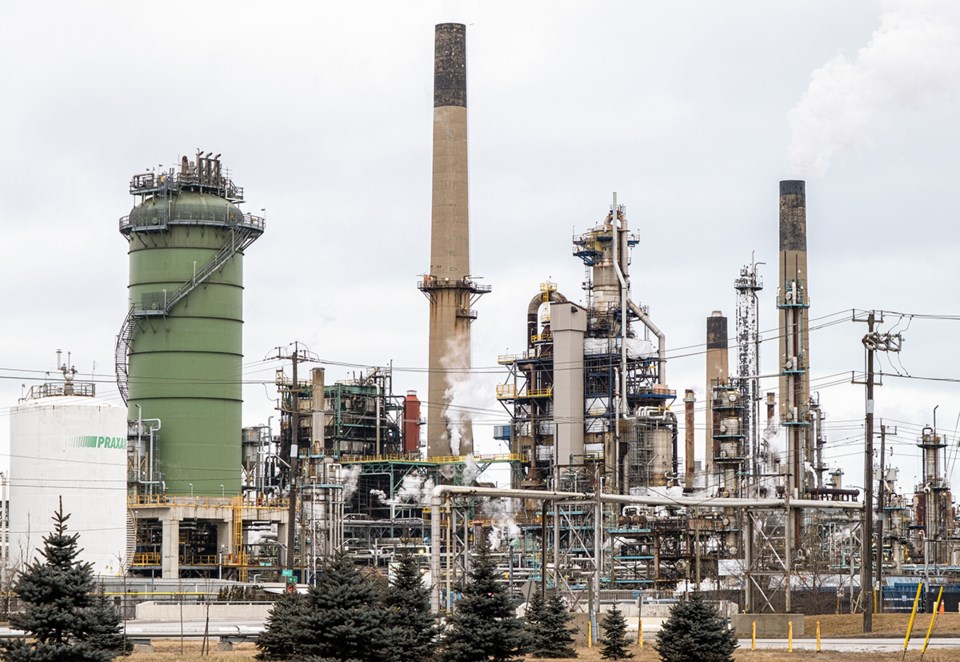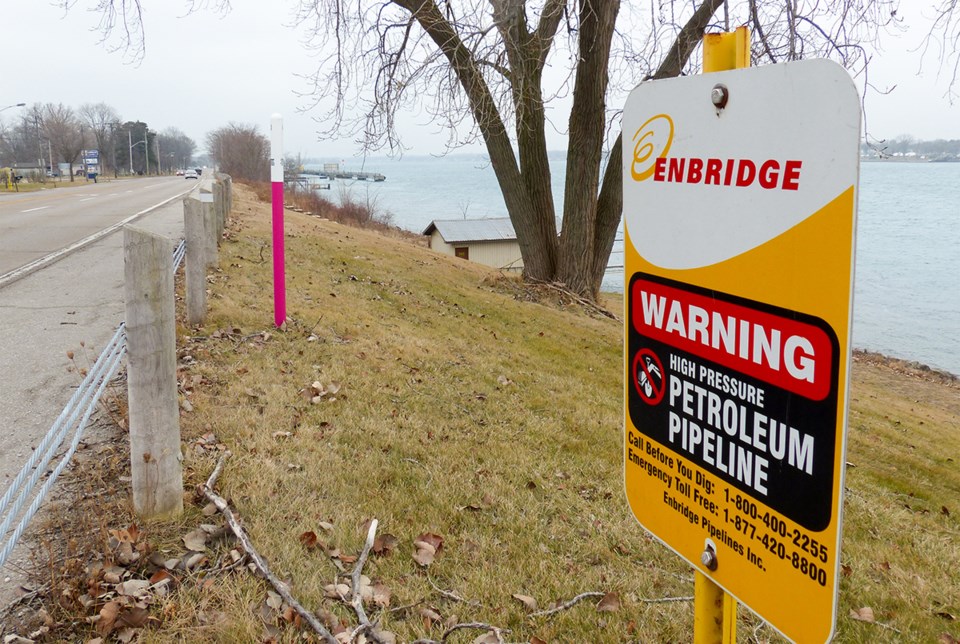Troy Shantz & George Mathewson
If the Line 5 pipeline from Alberta to Sarnia ruptured where it crosses the Straits of Mackinac more than 1,000 kilometres of Great Lakes shoreline could be contaminated with oil.
Crude would ooze into Georgian Bay and threaten the drinking water of millions on both sides of the border.
So claims a University of Michigan study that concludes 70% of the spill would never be recovered, resulting in an economic hit of $6.3 billion over five years.
“People come to Michigan and Canada because of the Great Lakes, not because of an oil pipeline. And they’re certainly not going to come if there’s a black stain in our Great Lakes, said Liz Kirkwood, executive director of the non-profit organization For Love of Water, which commissioned the study.
Line 5 is a major pipeline carrying Western crude to refineries in Sarnia and the U.S., which in turn produce propane, gasoline, asphalt and feedstock for chemical, plastic and rubber manufacturers.
The ageing pipeline is a key piece of Sarnia’s petrochemical economy, and thousands of local jobs rely upon it.
But it was environmental concern that prompted Governor Gretchen Whitmer to announce Michigan would revoke a 67-year-old easement allowing the pipeline to operate under the Straits, and ordered Canada’s Enbridge Energy to stop using the pipeline by May.
The conflict pitting commerce against the environment is an old one, said Peter Smith, a federal Green Party candidate and retired engineer who worked at Polysar and TransAlta.
“Nobody would permit an oil pipeline like this to be built today; it simply wouldn’t be approved,” he said.
“So why is it OK to continue operating such a pipeline even though it is now over 67-years-old?
“The only answer, of course, is the economy and jobs.”
Michigan’s objections to Line 5 intensified in 2018 when a ship dropped a 12,000-pound anchor in the Straits, slicing cables and dinging the pipeline itself.
Kirkwood said the threat isn’t hypothetical —Line 5 has suffered more than 30 spills in its lifetime.
“It’s quite remarkable that the Canadian response has really just focused on jobs and the economy related to the fossil fuel industry, rather than talking about the incredible responsibility of protecting the Great Lakes,” she said.
Enbridge has a plan to reroute the pipeline through a new tunnel dug deep into bedrock beneath the Straits, with a new easement and a 99-year lease.
But critics at a Michigan Public Service Commission hearing last year urged commissioners to axe that idea and decommission the pipeline.
In Sarnia, opposition to Michigan’s plan is mounting thanks to a lobbying effort involving, among others, union leaders, corporations, Lambton Federation of Agriculture, MPP Bob Bailey, MP Marilyn Gladu and Mayor Mike Bradley.
Bradley has urged Michigan to reconsider and asked Prime Minister Justin Trudeau to intervene by upholding an existing international pipeline treaty that protects Line 5.
Last week, Bradley invited another 44 Ontario communities to join the effort, pointing out the pipeline’s loss will dramatically increase the price of gasoline and propane, and require less secure trains, trucks and ships to transport fuels.
Kirkwood said Line 5 is just one of multiple pipelines servicing Sarnia. Enbridge pipeline Line 78, for example, carries 500,000 barrels of oil daily and could cover the shortfall, she said.
Not so, says Enbridge. Line 78 carries crude but not the natural gas liquids needed to make propane — a major local product for markets in Ontario, Quebec and several U.S. states.
In fact, Plains Midstream Canada has said it will close its natural gas liquids fractionation plant on Plank Road in Sarnia if Line 5 is shut down.
“There are no pipelines or other alternatives that can readily substitute for Line 5 in transporting the crude oil and natural gas liquids to the refineries and other facilities served by Line 5,” Enbridge spokesperson Tracie Kenyon told The Journal.
“That being said, we are always looking at options to ensure volumes on our pipeline system are optimized.”
Kenyon said Line 5, which crosses 400 waterways on its 1,038-kilometre route, is operated safely.
The company invested $15.7 million in advanced leak detection systems in 2019 and its maritime control centre monitors operations 24 hours a day.
“Our specially trained staff can immediately close remotely controlled isolation valves - with full closure occurring within three minutes of activation - to isolate the affected section of the line,” she said.
In 2010, alarms sounded at Enbridge’s Edmonton headquarters when a 40-foot length of Line 6B ruptured, emptying 800,000 barrels of diluted bitumen into Michigan’s Kalamazoo River.
Control-room staff reportedly didn’t interpret the alarms properly and weren’t aware of the spill until 18 hours had passed.
More than 56 kilometres (35 miles) of waterway were fouled, prompting evacuations and a five-year cleanup for one of the largest inland oil spills in U.S. history.
Kenyon said Enbridge learned important lessons from that spill near Marshall, Michigan.
“After the Marshall release… we made a promise to the people of south-central Michigan to restore the area, including the Kalamazoo River and Talmadge Creek,” she said. “And through years of cleanup, maintenance, remediation and rehabilitation, we fulfilled that promise – the river is clean.”
In the end, the courts will likely decide whether Line 5 remains open or not. Enbridge may force the issue by defying Gov. Whitmer’s orders and refusing to close Line 5 in May.
Regardless of the outcome, though, the bigger issue for Sarnia-Lambton is the community’s heavy reliance on fossil fuels, said former provincial Green Party candidate Kevin Shaw.
“If the demand (for oil) is not going to be there 10, 15 years down the road, then what is our plan for our economy and our jobs here?” he asked.
“It’s not a good feeling to be relying on this product that’s coming from half a continent away.”

